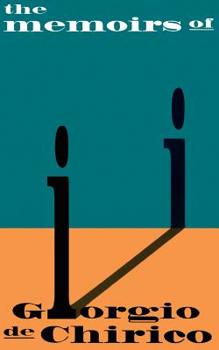Memoirs of Giorgio de Chirico
Select Format
Select Condition 
Book Overview
No Italian painter of this century has aroused so much comment, from eulogy to outright condemnation, as Giorgio de Chirico (1888-1978). One of the initiators of surrealism, he is a key figure in modern art; his influence on later painters, particularly during his "metaphysical" period, is vast. De Chirico relied on imagery from the unconscious to create art with mythological, philosophical, and historical overtones, so that his paintings have an...
Format:Paperback
Language:English
ISBN:0306805685
ISBN13:9780306805684
Release Date:March 1994
Publisher:Da Capo
Length:262 Pages
Weight:0.70 lbs.
Dimensions:0.7" x 5.4" x 8.4"
Customer Reviews
2 ratings
Comical, obsessive, paranoid, ironic, and brilliant.
Published by Thriftbooks.com User , 22 years ago
In the first section, this book is the best set of personal memoirs I have ever read, surpassing even Robert Graves' "Goodbye to All That". De Chirico could have been a great novelist, had he chosen that path. His descriptions of a childhood in Greece are unforgettable. But his novel "Hebdomeros" was also a beautiful piece of writing. It's interesting that three major painters associated with surrealism, De Chirico, Dali and Magritte, were also great writers. (De Chirico would hate to be associated with surrealism, but like it or not - he's their Daddy.) I'm disappointed in part II of the memoirs. I'm also disappointed in what de Chirico does not tell us in part I. He barely touches on his relationship with Apollinaire, wherein the poet would give titles to some of de Chirico's paintings. He doesn't mention his thoughts on learning of Apollinaire's death. He doesn't tell us which paintings he titled, and which were given names by Apollinaire. On one page, Paul Eluard had good enough taste to purchase his paintings, and thus was not beyond redemption. Yet on the very next page, Eluard was an onanist and a mystical cretin. What happened in a few paragraphs to change his opinion of the man? De Chirico doesn't tell us, except to blame the corruption of Eluard on Andre Breton. Many details important to students of the era were not even mentioned. Isabella Far is written about at length. Yet de Chirico does not even mention his wedding to her. They are companions for decades and suddenly, he refers to her as his wife. Duh? When did you get married? Where were you? What was the wedding like? Somebody correct me if I overlooked something.He outlived almost all of his enemies, (and according to de Chirico, his enemies were more numerous than the stars in the sky). He outlived almost all of the surrealists. What did he think when learning of the deaths of Eluard or Breton? What was his opinion of Magritte, to whom he had once written a friendly thank you note? What was it Magritte had written to him? Unfortunately, details like this are not to be found. Instead, we get an enemies list of Italian critics and modernist painters, whose names most readers in the English-speaking world will not recognize. Even so, the character revealed in these memoirs is unique. He's obsessive, paranoid, romantic, imperious to the modern world, and at times comical. But he is always guided by a stubborn integrity and a search for what he called "mystery and poetry". Yet, he is involved in such comical episodes. He's been accused of forging his early paintings and selling them. He's accused of denouncing some of his genuine early paintings as forgeries because he was jealous of the high prices they were drawing. His later work could not command such high prices. Even stranger and more ironic, he's accused of forging his own paintings and then denouncing his forgeries as forgeries! Despite these absurd adventures, no painter ever left a body of work that was more replete w
Autobiography of genius (in both senses)
Published by Thriftbooks.com User , 26 years ago
De Chirico, historically the first (small s) surrealist (even the Surrealists admit this) was exalted as a visionary for his earliest paintings, then conveniently vilified by his followers (led by the despicable Andre Breton) when he radically changed his style. The bitterness and frustration of this situation (and it was a long frustration -- De Chirco lived well into his nineties) is very much to the fore in this remarkable book. The mysterious qualities of his painting, too, are much in evidence, and great care is lavished on seemingly trivial incidents whose significance is left very much to the reader's own cogitations. Unforgettable are such passages as his defense of "maisons closes" (whorehouses) as decent workplaces, his memories of the Dalcroze-inspired Braun sisters, and the strange juxtaposition of his being required as a boy to kiss a priest's hand with the frustration of having always to refuse his barbers' offers of a rubdown. Not a book for everyone, surely, but for those seeking to unravel one of the great enigmas of 20th century art, essential. Footnote: De Chirico's status as a painter is currently going through a fascinating process of re-evaluation, and the "new" case for De Chirico is perhaps most eloquently put forth in a beautifully produced catalogue from Hunter College and the Fondazione Giorgio e Isa DeChirico in Rome, titled "Giorgio De Chirico and America," filled with superb reproductions, documentary photographs and stimulating essays.






